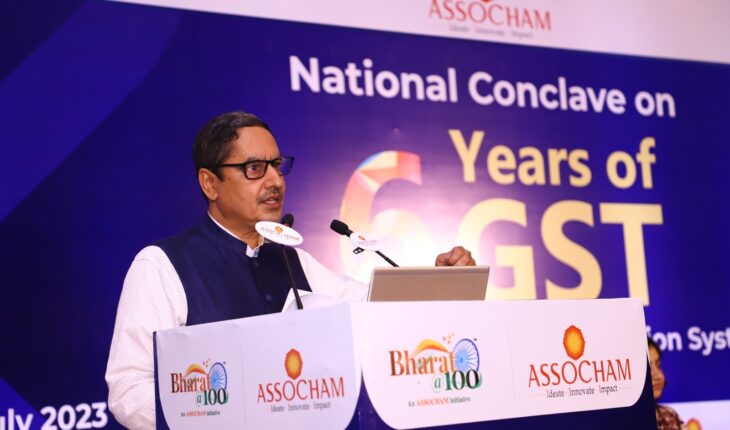New Delhi : We are clocking an average monthly revenue of Rs. 1.69 lakh crore in FY 2023-24 because of improved compliance and greater formalisation of the economy. Revenues are growing without having to increase tax rates to match revenue neutral rate. The number of registered taxpayers now stands at around 1.40 crore from 67.83 lakhs when GST started, said Shashank Priya, Member (GST), CBIC, Ministry of Finance, at the National Conclave on 6 years of GST organised by ASSOCHAM.
“The GST law which is completely home grown has now stabilised. The GST law which appeared complex at the beginning is now understood well by both trade and officials. A pilot is in the works for biometric authentication of Aadhaar of high-risk applicants with OTP verification on e-mail and mobile number linked to PAN. Risk score will be determined on the basis of detailed risk parameters and sophisticated data analytics which will be further made robust by using Artificial intelligence and Machine Learning” he said.
“Special attention has been paid to MSMEs under GST and they now have easier access to a unified market through a more facilitate interstate movement of goods. The burden of record keeping, multiple audit and return scrutiny have been eased and the provision of online payment has saved them labour. To facilitate easier compliance, the benefit of composition schemes for annual turnover upto Rs. 1.5 crore QRMP for annual turnover upto Rs. 5 crore, optional annual return, waiver of annual reconciliation statement and filing NIL returns through SMS have been extended to MSMEs.” he added.
Speaking at the conclave, Manish Kumar Sinha, CEO, Goods and Services Tax Network (GSTN), said “Circumstances and overall direction of GST would indicate that we are moving towards vendor ratings which may include providing all relevant data points to the industry to arrive at the same. On one hand there is the issue of fake dealers and on the other there is a large segment of industry that is compliant. The GST law has a section dedicated to compliance rating and this will in one form or the other come into play.
From a industry usage perspective, a committee is deliberating on placing more data in the public domain which will provide more insight on geography and industry specific information based on GST data. We are also in the process of integrating GSTR1 data as a financial information provider on account aggregator platform. More such platforms with linkages to GST will be set-up. For MSME credits becoming available based on their GST activity will be a reality very soon.” He added.
Setting the context at the conclave, Pratik Jain, Chairman, National Council on Indirect Taxes ASSOCHAM said, “With the implementation of GST the number of taxpayers has increased across the country and the improvement in the efficiency of the supply chain. The new taxation process has resulted in a reduction in product prices, benefitting the consumers. The government has collected around 1.5 lakh crore through GST and the next phase of GST is set for consumer empowerment.”
Addressing the conclave, Vineet Agrawal, Sr. EVP and Group Head (Taxation and Ethics), JSW Group & Co-Chair, National Council on Direct Taxes ASSOCHAM said, “GST is still at a nascent stage, six years is not a long time for a legislation but for a country of our size and tax base of more than 1.4 crore, we have enough experiences with us to say that life has become easier for tax professionals and corporates. For consumers cost has become cheaper.”
During the event, ASSOCHAM released a paper on GST recommendations detailing across various facets of GST – Compliance, Legislative, Litigation. The conclave also saw interesting sessions and panel discussions where industry experts engaged in insightful discussions on Policy Level reliefs / issues – Rate rationalisation, Refund for inverted duty structure (services), Setting up Sectoral Committees, setting up a GST Tribunal. Key issues that require immediate redressal such as, legislative issues under GST to reduce litigation such as GST vs. cross charge, Discount, issues related to refund, etc. were also discussed.





